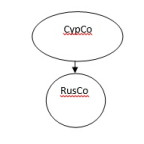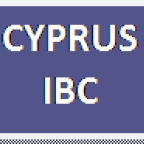ASSET PROTECTION & CYPRUS INTERNATIONAL TRUSTS
A. WHAT DOES ASSET PROTECTION MEAN?Asset protection is the adoption of advance planning strategies which place, in a legal and efficient manner, one’s assets beyond the reach of future potential creditors or other claimants as well as forced heirship or matrimonial rules. It’s a legal device that is designed to provide a substantial barrier to an attack on assets from potential creditors. In our practice, it does not involve hiding assets, nor is it based upon secret agreements or fraudulent transfers. It is based upon proven sophisticated combinations of business and estate planning techniques. The methods employed vary from outright gifts to the sophisticated use of legal entities, limited partnerships and trusts.
B. WHO SHOULD CONSIDER ASSET PROTECTION PLANNING? Any high income, high net worth individual whose business, investment, or other activities expose him or her to potential litigation or forced heirship or matrimonial rules. Clearly, doctors, investors, real estate developers, corporate directors, executives, and other persons person engaged in commercial or industrial business are exposed. A net worth of approximately $500,000 is a guideline point where the benefits of sophisticated asset protection planning begin to outweigh the costs. However, many levels of asset protection planning are available, and some strategies are available to almost everyone.
C. HOW DO LAWYERS DECIDE WHETHER TO SUE SOMEONE? When a potential client consults a litigator, the attorney will analyze the merits of the client’s case, and, if the case looks strong, make a determination regarding whether a judgment, if won, can be collected. If the lawyer does not believe he can collect the judgment-the source of his fee - he will not take the case. Sophisticated asset protection planning reduces or eliminates the ability of a creditor to collect a judgment against your personal wealth, making you an unattractive target for the litigator.
D. THE CONCEPT OF TRUSTS GENERALLY
The various types of trust vary in complexity but they have one common fundamental feature. A “person” being either an individual or a company (“the trustee”) agrees to hold certain assets (“the trust property”) in its name for the benefit of another person (“the beneficiary”) on certain terms and with certain powers (which are usually set out in the Trust Deed). The assets comprising the trust fund are legally held and registered as owned by the trustee and the trustee is under a duty, enforceable in the Courts, to hold those assets and the income arising from them for the benefit of the beneficiary/ies.
The above relationship can be summarized as follows: The trustee has legal title to the trust assets and the beneficiary has beneficial or equitable interest to the trust assets (it is the beneficial title which is of value when one is considering asset ownership).
The other important parties of the trust are:
· The settlor:This is the person that creates the trust. In some jurisdictions the settlor could not act as trustee or be a beneficiary. In the Cyprus jurisdiction, the settlor can also be a trustee or beneficiary.
· The protector: This is the person(s) that has the power to restrict key powers (such as add beneficiaries, etc.) of the trustee so that they can only be exercised with the consent of a suitable person.
E. E. THE CYPRUS INTERNATIONAL TRUST
Trusts in Cyprus are primarily enforceable pursuant to the Trustees Law of 1955, Cap. 193.
In the year 1992 Cyprus enacted the International Trusts Law 69(I)/92, which was amended in March 2012, thus, the International Trusts (Amending) Law of 2012 was adopted (the “ITL”) and international trust (the “International Trust”) can be set up and used as an asset protection vehicle.
The conditions to establish an International Trust:
Section 2 of the International Trusts Law requires:
(i) The settlor and beneficiary/ies are not permanent residents of Cyprus in the year preceding the year of the creation of the International Trust;
(ii) The trust property can include any kind of movable and immovable property situated in Cyprus or anywhere in the world;
(iii) At least one of the trustees is a permanent resident of Cyprus.
It should be noted that according to the proviso in section 2 of the ITL a trust shall not fail to qualify as an international trust by reason only that either the settler or the trustee or any one or more of the beneficiaries is a Cyprus international company.
The nature of the Cyprus international trust could be “discretionary”.
As the name suggests the discretionary trust allows the trustee to exercise a large element of discretion with regard to distribution of income and assets, and to choose from a large “pool” of potential beneficiaries. The selection of beneficiaries from the “pool” could vary every year.
F. F. BENEFITS OF CYPRUS INTERNATIONAL TRUSTS
The following benefits relate to Cyprus International Trusts, provided conditions set out in section 2 of the International Trusts Law, as outlined above, are satisfied, as well as noting that the below tax advantages shall apply provided the income is earned from the sources outside of the Republic of Cyprus:
· Income, gains and profits from non- Cyprus sources are exempted from income tax, capital gains tax, special contribution or any other taxes in Cyprus.
· No estate duty or inheritance tax in Cyprus
· Registration of the trust does not require the submission of the relevant Trust Deed or the disclosure either the settlor or the beneficiaries and therefore confidentiality is safeguarded (expect under a disclosure order by a Court in Cyprus which is granted only in cases of fraud).
· There is no taxation of International Trusts or their income in Cyprus.
· May be used to reduce or eliminate inheritance tax of the settlor.
· May be used to distribute untaxed income in Cyprus to the beneficiaries, i.e. family members
· Ideal for “high worth” individuals
· Especially ideal for “high worth” individuals with slightly complicated family structures i.e. divorced and children from different spouses.
· Trust may hold shares of Cyprus Company with Cypriot nominees for confidentiality.
· No exchange control regulations.
· The same person can be the settlor, the trustee (through Cyprus International Business Company, in which he/she can be the sole director and he/she can be the only beneficial owner of the shares) and also a beneficiary i.e. an individual could have direct absolute control and ownership of the trust fund.
· An International Trust may form a Cyprus international business company, partnership or branch and obtain the benefits available to them.
· An International Trust may carry out business in Cyprus subject of course to the laws of the country which are imposed on the beneficiaries and not on the trust itself.
· Trust capital received in Cyprus by a foreigner resident or retired in Cyprus from trusts not resident in Cyprus is not taxable on the trustee.
· Dividends, interest or royalties received by an International Trust from a Cyprus international business company are not taxable and not subject to any withholding tax.
· Registration requirements are fulfilled by notification of the following particulars to the relevant Cyprus competent authority:
(i) The name of the trust;
(ii) The names of the trustees at all relevant times;
(iii) The date of creation of the trust;
(iv) The date of any change in the law governing the trust;
(v) The date of termination of the trust.
· Asset protection – Time limit for filing actions against an International Trust
The main advantage of an International Trust is the separation of the legal ownership from the beneficial ownership. For legal purposes the trustees of the International Trust are recognized as the legal owners of the assets and the beneficiaries are protected by a body of legal rules, which require trustees to adhere to strict duties as to how to manage the trust. That is why an International trust is such an irreplaceable tool for asset protection. Assets transferred to a trust are no longer part of the property owned by the settlor and cannot be claimed by creditors, litigators, etc. The assets could be protected if the settlor is experiencing financial difficulties due to bankruptcy, divorce or a professional negligence claim. In case the settlor was found to be insolvent, a portion of his assets may have been safely placed in the trust structure offshore, prior to his being declared insolvent.
Asset protection should be taken as a preventative measure. You should consider setting up an International Trust before you have a lawsuit filed against you. It works like insurance. It is too late to buy insurance when your house is on fire.
An International trust shall not be void or voidable and no claim may be made in respect of the assets that have been transferred to an International Trust, in the event of the settlor’s bankruptcy or liquidation or in any action or proceedings against the settlor or at the suit of his creditors not withstanding any provision of the law of Cyprus or any other country.
An International Trust may be set aside by the settlor’s creditors to the extent that is proven to the satisfaction of the Cyprus Court that the International Trust was made by the settlor with the intent to defraud the creditors. The onus of proof of this intent shall be on the creditors. The creditors shall prove that the trust was made with the intent to defraud them and that they were creditors at the time of the making of the trust. An action by creditor against a trustee of an international trust shall be brought within a period of two years from the date when the transfer or disposal of assets was made by the settlor to the International Trust.
Amongst other changes which were introduced by the ITL in 2012 are the below mentioned, which are the most significant;
(i) S. 5(1) (a) of the ITL abolishes all the restrictions on the duration of the International Trust;
(ii) S. 3(1) of the ITL, confirms the validity of the trust created by any person who is of full age and of sound mind under the law of the country of which he is a resident;
(iii) All matters arising in respect of an International Trust or any disposition of property under that trust shall be determined by the laws of the Republic of Cyprus and no other laws (s. 3 (1A). The trustee’s fiduciary powers and duties of the protector are regulated and governed exclusively by the laws of the Republic of Cyprus;
(iv) Moreover, the validity of the International Trust or any transfer or disposition under that International Trust will not be effected by the laws relating to succession or inheritance in force in Cyprus or any other jurisdiction or if other jurisdiction does not recognize the concept of the trust (s. 3(1A)). It is in effect rendering the International Trust immune from forced heirship rules, a legal concept recognized amongst others in such European countries like France, Germany, Spain, Italy and the Russian Federation.
(v) Moreover International Trust shall not be void or voidable and no claim may be made in respect of the assets that have been transferred to an international trust in the event of the settlor’s bankruptcy or liquidation, unless and to the extent it is proven to the satisfaction of the Court that the International Trust was made with the intent to defraud the creditors of the settlor at the time of the transfer of his assets to the trust (s. 3(2) (3)) and the same section sets a statutory time limit as to when such action can be brought against a trustee of the International Trust to two years;
(vi) Under S. 8 of the ITL, the trustees have extensive investment powers. Amongst others the trustee may hold, retain or invest in any movable and immovable property in the Republic of Cyprus and overseas, as if s/he would have done had he been the absolute beneficiary of the assets of the trust;
(vii) According to s. 4 of the ITL the powers of the settlor were extended and include:
(a) The revocation, amendment of the terms of the trust or any trusts, or powers arising wholly or partly from it;
(b) to advance, distribute, pay or otherwise apply income or capital of the trust property or to give directions for the making of such advancement, distribution, payment or application;
(c) to exercise the powers of a director or officer, or issue binding directions as to the appointment or removal of, a director or officer of any company wholly or partly owned by the trust;
(d) to issue binding directions to the trustee in connection with the purchase, retention, sale, management, lending , pledging or charging of the trust property or the exercise of any powers or rights arising from such property.
(e) To appoint or remove any trustee, enforcer, protector or beneficiary;
(f) To appoint or remove any investment manager or investment adviser;
(g) To change the proper law of the trust;
(h) To limit the exercise of any powers or discretion of a trustee by requiring that they are only exercised with the consent of the settlor or any other person specified in the terms of the trust.
(viii) When the above powers have been reserved or granted to the settlor either in his capacity as a settlor, protector or enforcer of the trust, the trustee who acts in accordance with the exercise of the power is not deemed to be acting in breach of trust.
When the powers outlined above have been reserved by the settlor, or conferred on him in his capacity as a protector or enforcer of the trust, no intention to defraud may be imputed to the settlor.
· Inheritance Planning:
A lot of people these days do not want their assets to be passed to the heirs prescribed by law. If you require more complicated arrangements, like providing a source of income to somebody for life or putting money aside for children’s education, an international trust is an ideal tax planning tool for these purposes.
Trusts help to avoid forced heirship, but you must choose carefully the jurisdiction where you want to establish the international trust. On death the estate of person goes through the probate procedure which is lengthy, expensive and is open to public eyes. Establishing a Cyprus International Trust can avoid all these problems.
The Inheritance and succession Law of the Republic of Cyprus as well as of any other country does not affect in any way the transfer or disposition of assets by the Settlor or the validity of the International trust.
· Tax Planning:
An International Trust can be an exceptional tax planning tool and if correctly structured it will produce substantial savings in income tax, capital gains tax, inheritance tax, and stamp duty.
Because the beneficiary of the international trust is not a legal owner of it, the income and capital gains are taxed in accordance with the rules of the residence of the legal owners – the trustees.
· Simplified Management and Dispute Resolution
Where in a company there are numerous shareholders or where there is the need for additional security in the management and decision making processes in a company it is often desirable that the whole shareholding of the Company is held by a Holding Company. This Company may in turn be held by a Trust for the benefit of all the shareholders and is managed according to the terms of a Trust Deed agreed by the shareholders and signed by them and the Trustee at the declaration of the Trust. In such a case we have multiple settlors and multiple beneficiaries. This structure avoids any possible deadlocks, oppression of minorities or instability in the management of the Company as the Trustee will be able to handle any central management decisions according to the Trust deed thus allowing the shareholders to feel the necessary security to invest in this structure.
This set up also allows disputes between the shareholders to be removed from the original jurisdiction and placed in a more stable or developed jurisdiction away from possible local influences. Coupled with the provision of an arbitration procedure to resolve disputes prior to recourse in the Courts it allows for an efficient fast way out in cases where the matter would drag for years in the national Courts and cause losses to the Company which would not be able to function in between.
The Trustee will always proceed according to the procedure of the Trust Deed and in this respect the Company is functioning continuously away from any disputes which are resolved through an independent process not affecting the working of the Company.
· Removal from the Jurisdiction
Cyprus Law allows for the removal of a trust from its jurisdiction, hereby providing for the necessary flexibility in cases where a change of circumstances may mean such transfers would be advantageous for fiscal or other reasons.
· Confidentiality and non-disclosure
Confidentiality is of paramount importance. No government or Central Bank of Cyprus official may disclose to anybody any information or documents in connection with:
a. Settlor
b. Beneficiaries
c. Trustees and their duties
d. Accounts or property of the trust
However, a beneficiary is entitled to request from the trustees information about the accounts of the trust. Furthermore, the court may order the disclosure of information or documents in criminal or civil proceedings cases of fraud, where the disclosure is important.
On asset transfer during the probate procedure, the tax authorities need to see the list of all assets owned in order to assess it for estate duty. The details of the assets therefore are open to the public. It is not wise to disclose the offshore structure which was set up during ones’ lifetime on death, as it would have negative tax consequences. An international trust is an alternative legal method to a Will for transferring the assets which do not have to be included in the Will, hence disclosed to the tax authorities.
One can also derive benefits from setting up an International Trust if you want to protect the welfare of infant children, the aged, or disabled people; or just want to preserve the family wealth with possible payments to members of the family as they are needed and to gain planning flexibility.
· Stamp duty
A Cyprus international trust is subject to stamp duty of €430. If the trust deed is stamped more than 30 days after the date of creation of the trust, a late payment fine is charged. The amount of the late payment fine depends on the length of the delay.
G. G. TYPES OF CYPRUS TRUSTS
Discretionary Trust
Under this trust, the trustees have a general discretion over the amount of benefits and the manner by which the beneficiaries might enjoy such benefits. The beneficiaries may be defined according to name or reference to a class (i.e. the settllor’s children) or simply left to the full discretion of the trustees. Usually, the settlor indicates to the trustees his wishes for the disposal of the trust property by means of a Letter of Wishes.
Should the settlor wish to give a more positive guidance than relying on a Letter of Wishes, it is possible to include a third party in the trust deed known as the “protector” or “nominator”. The protector’s role is to prevent the trustees from exercising their discretion in certain circumstances. The trustees will usually exercise their discretion with the prior consent of the protector or nominator.
Fixed Trust
Under a fixed trust, the trustees have no discretion in distributing the trust assets to the beneficiaries. For example, under such a trust the trustees are directed to distribute the income to a designated individual for a fixed period of time and thereafter distribute the capital of the trust to a specific beneficiary or beneficiaries.
Fixed and Discretionary Trust
This type of trust gives discretion to the trustees over the distribution of income for a period of time. However, they may be required to distribute the income to a specified individual or individuals in fixed amounts, while maintaining discretion over the distribution of the capital amongst a class of beneficiaries.
Protective Trust
This trust is appropriate when a beneficiary is given a life interest which may become discretionary on certain defined events, such as the bankruptcy of the beneficiary.
Declaration of Trust
This is a variation of the discretionary trust in which the settlor is not named in the trust deed and the trustees declare that they hold the assets which were transferred to them on trust. In such a case, the trustees accept a Letter of Wishes.
Trading Trust
Under this trust, the trustee is usually a limited liability company which has powers to carry on business, and the trust has trading functions and employees to manage its business. Since all documentation used is in the name of the trust company, third parties are not aware of the existence of the trust.
H. H. PROTECTIVE TRUST CLAUSES
The protection available through the use of a Cyprus International Trust may be enhanced through creative drafting. The following is a brief description of certain provisions which may be included in the International Trust in order to achieve such enhancement.
Trust Protector Clause: The trust protector clause, enables a designated person or persons, other than the trustee, to exercise certain powers with respect to the trust.
Examples of common trust protector powers include: removal and replacement of trustees, veto of discretionary actions of trustees, consent to trust amendments proposed by trustees. Properly structured, the provision can permit the trust protector to retain significant negative controls over any specified aspect of the trust. As with provisions appointing trustees, the trust protector provision should include language addressing vacancies, succession, and related issues.
Duress Clause:As discussed above, a trust may empower a person or persons other than the trustees to advise the trustees, or to direct or veto an act or decision of the trustees, and/or trust may grant a non-trustee the power to remove and replace a trustee with or without cause. The typical duress clause will direct the trustee to ignore any such advice, order, or instruction where such is given under duress by the person granted such powers under the instrument. A duress provision is quite effective where the power holder is located in one jurisdiction, and the trustee, who can ignore a duress driven directive, is located in another jurisdiction (as would be the case with a typical offshore trust). As a result of such jurisdictional diversification, a carefully constructed duress provision can have the effect of permitting the retention or granting of significant control over the trust, by or to non-trustees, such as the settlor or other persons, while at the same time precluding the effective forced exercise of such powers.
Flight Clause: The flight clause permits the trustee to change the trust situs and/or governing law if the trustee deems such change to be advisable in order to protect the trust from a potential threat of any kind. Such a provision is commonly included in a trust to address various situations, not the least of which is civil unrest or an unfavorable change in the law or political climate of the situs jurisdiction. The functionality of the flight clause can be substantially enhanced by coupling it with a power of attorney held by the trust protector to effect title changes in specified circumstances.
Thus structured, the flight clause provides a substantial safety net for a trust in the event of an unfavorable change in the lex domicilii, civil unrest or political change in the situs jurisdiction, or in the event of an anticipated attack on the trust by a creditor. Such a provision would permit a trust to change its situs, governing law, and the courts in which litigation concerning it must be brought – an important asset protection tool in the face of an oncoming creditor challenge against the trust.
Spendthrift Clause: A spendthrift clause is a restraint on the voluntary or involuntary alienation of a beneficiary’s interest in a trust. Such clauses are sometimes augmented by language which provides for a forfeiture of a beneficiary’s trust interest upon an attempt by the beneficiary to transfer it, or by these creditors to reach it, or language which converts required trust distributions into discretionary distributions upon the occurrence of certain creditor related events.
I. I. EXAMPLES OF ADVANTAGEOUS USES
Example 1
As a vehicle of holding shares in Russian legal entities
The Client or clients establish a Cyprus International Trust which owns through its fully owned Cyprus International Business Company all the shares of a Russian legal entity.
According to the existing double tax treaty between the Republic of Cyprus and the Russian Federation the withholding tax for dividends received in Cyprus is 5% if the beneficial owner has directly invested in the capital of the company not less than the equivalent of USD100.000 and 10% in all other cases.
By transferring the shares of the Russian legal entity to the Cyprus IBC we will secure that it will be entitled to be benefited from the relevant provisions of the aforesaid double tax treaty regarding withholding taxes for dividends received (i.e. 5% or 10% accordingly).
The Cyprus IBC generally is subject to the low taxation of 10% on their net profits and no withholding tax is levied on dividend payments made by the said IBC to shareholders resident abroad or to the trustees of the Cyprus International Trust. When however the income of the IBC is comprised of dividends from a Russian subsidiary Company in which it holds more than 1% and whose activities are not at least 50% investment activities NO TAX will be levied.
In addition no capital gains tax is charged on the disposal of the assets held by the Cyprus International trust (i.e. the shares of the Cyprus IBC holding the shares of the Russian legal entity).
The above structure furthermore secures that the liability of the International Trust is limited to the original capital paid to the Cyprus IBC.
The Client maintains reasonable control over the trust assets as a manager – (through duly executed Powers of Attorney) – of the Cyprus IBC and furthermore will have the ability to establish bank accounts, investment accounts etc through which he will have access to corporate visa/debit card in order to pay company related expenses. In addition the Client, as one of the beneficiaries of the International trust will receive any distribution of income to be made by the Trustees as per the terms of the Trust Deed which will be tax-free.
DIAGRAM I: INCOME FLOW

|
|
|
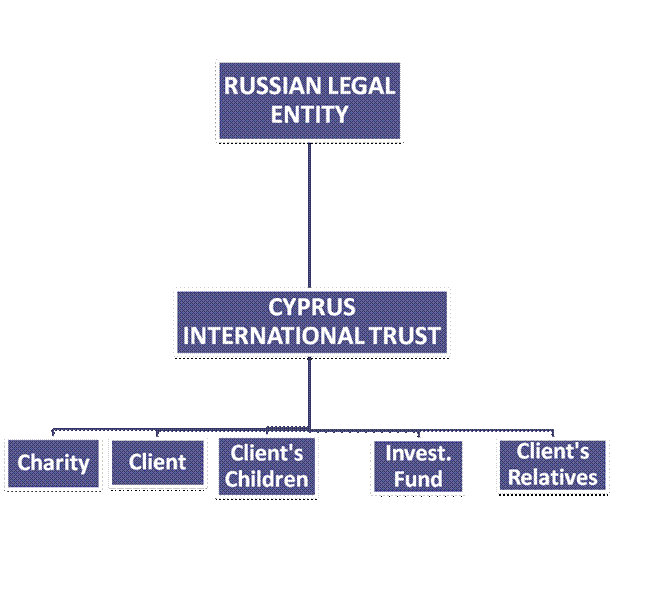
|

|
|
|
|

![]()
![]()
![]()

![]()
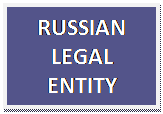

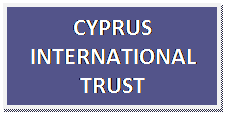

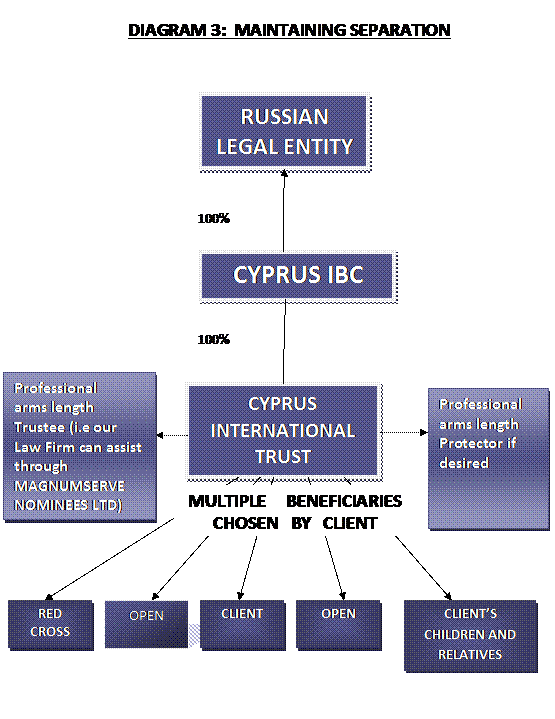
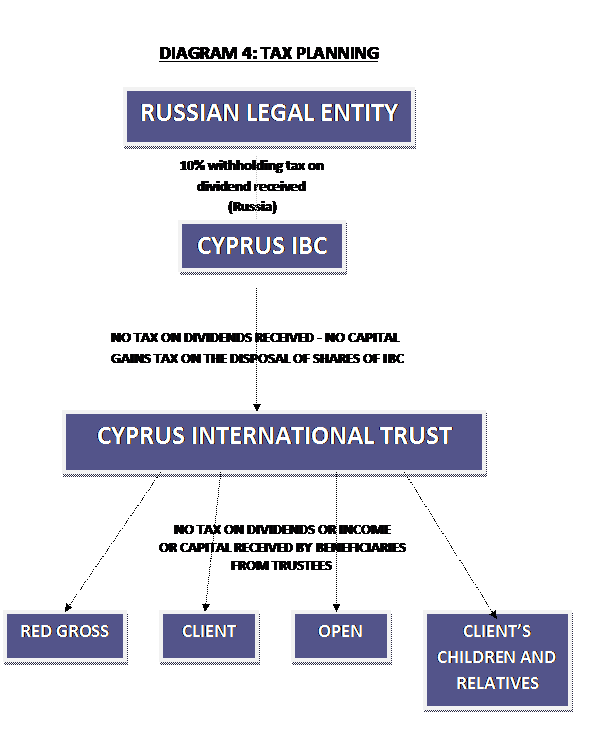
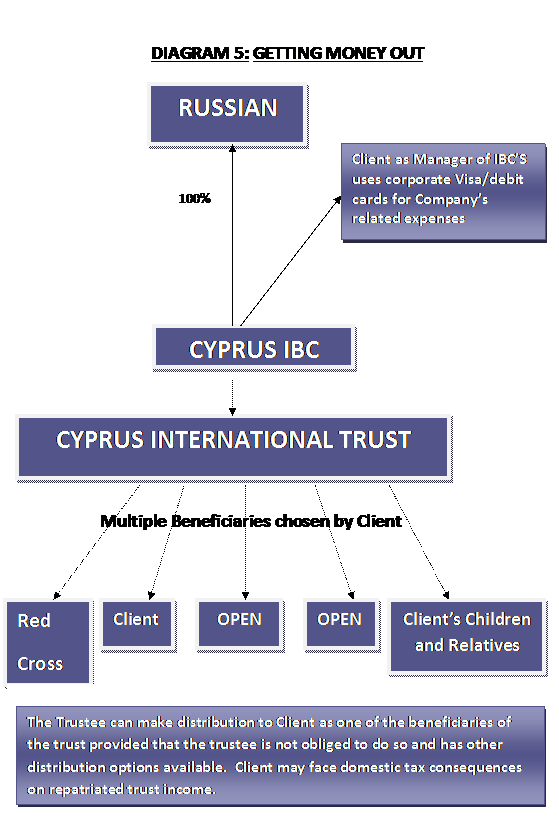
Example 2
As a vehicle for management of funds
Investment Trust Funds, Banks etc may through the use of a Cyprus International Trust and a Cyprus International Business Company that acts as a Trustee manage funds on behalf of their Clients.
Example 3
As a vehicle of holding property which cannot personally be held
A minor may not be able to hold property in his own name but a Trustee can often hold and manage it on its behalf until its maturity in order to take the control.
Example 4
As a vehicle of establishing collective investment
A Cyprus International Trust can be used as a vehicle by several persons to make joint investments. The trust can provide the basis of their co-operation and can regulate their relationships and the sharing of the financial results of their joint venture.
Example 5
As a vehicle of protection against high taxation
For Clients/Settlors residing in high taxation jurisdictions it is possible to minimize their taxation on income or wealth by transferring their property to a Cyprus International Trust in order to be able to take advantage – (as under a proper tax structure)- of the beneficial extensive double taxation network of Cyprus and the non-taxability of any income of the trust in Cyprus.
Example 6
As a vehicle of protection against spendthrift beneficiaries
The Cyprus International Trust can be used as vehicle of protecting family fortunes for future generations by safeguarding capital and avoid it being frittered away by spendthrift beneficiaries.
Example 7
As a vehicle of managing profit sharing & pension schemes
Through the use of a Cyprus International Trust, Companies can provide pension schemes benefit plans and profit sharing arrangements declaring their employees as one class of beneficiaries. The Trust provides a most effective method of grouping and sharing benefits and it has also the additional advantage of being able to cover any specific circumstance.
Example 8
As a vehicle of investing in business overseas
A Client who wishes to invest in business overseas but wishes to ensure that the profits and dividends are not remitted to the country of his residence, may establish a Cyprus International trust in order to use it as a vehicle for his investment.
Example 9
As a vehicle of asset protection
By establishing a Cyprus International Trust, a Client/Settlor can protect his assets against possible expropriation laws, future claims of Governments, claims from creditors, law suits or international blocking or freezing regulations in his home country.
In addition assets can be transferred to a Cyprus International Trust to protect the interests of a beneficiary e.g. sheltering the Inheritance of a daughter from claims in case of divorce or from the disposal of same by the son in law.
Example 10
As a vehicle of promoting causes and charities
Through the establishment of a Cyprus International Trust a Client/Settlor can provide for a charity, promote a religious or artistic cause or establish a foundation to support a worthy project.
J. J. COSTS AND FEES
(i) Fees will be quoted by us on a case by case basis depending upon the complexity of the work involved. The minimum fees for the set up and completion of the Trust Deed/Trust Instrument are Euro 3000. These are based on the absolutely simplest structure with minimal consultation. We have been involved in more complicated structures where the total fee can be as high as €120.000
(ii) Corporate trust and administrative services will be billed on a per hour basis and our minimum applicable fees are Euro 3000. The hourly charging rate of Partners is Euro 300 and of the administrators Euro 100.
(iii) The fees quoted above are the minimum applicable fees. The set-up costs and annual costs may increase in the event that extensive revisions are required to the standard structures or where extensive consultation is required.
(iv) A stamp duty of €430 is payable by the Client on the formation of the trust and is not included in the minimum fees quoted above.
(v) If the requested structure by the Client involves also the incorporation of a Cyprus International Business Company then the incorporation and annual administration fees of the IBC shall be in addition.
K. K. CONCLUSION
Cyprus appears to have one of the most comprehensive and conscientiously drafted legislations in the world.
Significant asset protection advantages can be gained through the use of a Cyprus International Trust. The very fact that the Asset Protection Trust is a Cyprus International Trust will have a significant deterrent effect on the Creditor’s decision regarding whether or to what extent to pursue assets.
Advance Planningis the key to effective asset protection.
IMPORTANT NOTE:
The above is intended to provide a brief guide only. It is essential that appropriate professional advice is obtained. Our firm will be glad to assist you in this respect. Please do not hesitate to contact us at:
Chrysanthou Mylona 10,
MAGNUM HOUSE
3030 Limassol - Cyprus
Tel. +357 25 028460, Fax +357 25 028461
Email: info@pittaslegal.comWeb: www.pittaslegal.com




















































































![The Law amending the Companies Law CAP 113 N.4 [89(I) /2015] and collectively (the ‘Law’) came into force on 19 June 2015 and brought with it several changes to the current legal regime.](/images/thumbnails/mod_minifrontpagepro/c6952199633f1f5fbe7f4566edeaf0c2_default.jpg)
